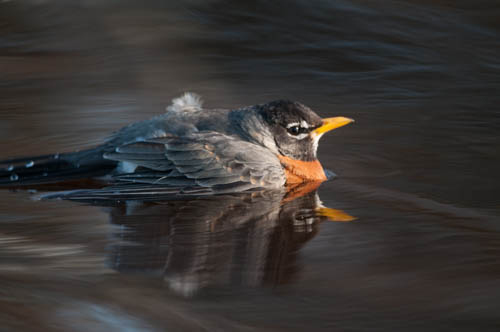The value in doing nothing

By Mitch Mode
Special to the Star Journal
Nothing is sometimes enough.
Or, on second thought, doing nothing is sometimes enough. Doing nothing of particular importance or value other than just doing it. Doing nothing that can be measured in the currency of the day-to-day, nothing that stands out or rises above, nothing out of the ordinary. Doing nothing. Sometimes that’s enough.
Doing nothing: A state of mind as much as anything. Idiot work, my dad called it. Just doing something to unwind the stress. Doing nothing, that’s pretty much what he meant. A physical act; a mental reward.
I split firewood the other day. Doing nothing? Close to that for me. I don’t need any more firewood; I’ve got enough split, stacked and under cover to last me for years. I only use it at the hunting shack. Do I need more? Not really.
But on a day under ragged gray cloud with air heavy with the chance of rain, on a day when the wind blew hard enough to chill but not with enough force to keep one inside, on that day I needed to do nothing. Nothing special, nothing heroic, nothing exceptional. Just do nothing. That would be enough.
The wood was oak. Cut to length a year ago, hauled uphill and then rolled down the other side; loaded in the pickup until the truck sagged with the weight. Then driven to my hunt shack and dumped without ceremony.
I’d planned to split it during deer season but hunting got in the way. Don’t know why. I always plan to take some time midday during that week to split firewood or do chores or go out with the camera. To do nothing. Last season that didn’t happen and I don’t know why. So the wood lay under snow and under cold and, this spring, under April rains.
Lay there until I had a day when I wanted to do nothing.
I found my leather work gloves, worn by use, scarred and battered but the leather soft and formed to fit my hands by the days of work wearing them. I hefted the splitting maul; held it to the thin April light. The maul blade is pewter gray from use, the handle long and solid and smudged with dirt worn into it. It is a simple tool, a wedge on a stick but built to purpose and in that purpose useful.
On some days simplicity has value above complexity and the splitting maul has an appeal that goes beyond function, goes to appreciation of good design that stands the test of generations and needs no improvement, no updates or uploads. It simply works as intended.
I tilted a bolt of oak upright, stepped back and raised the maul. A pause; then the maul arced down in a rainbow’s trajectory, a quicksilver flash of blurred light of steel. Impact: A satisfying crack as metal met wood. Then the blade came to a stop and the pieces of split oak fell aside.
I set the piece upright, turned it, lifted the maul, repeated the rise and fall. Again and again. When I had a pile of splits I stacked them under the firewood shelter’s roof and stepped back, set another piece of oak upright and reached for the maul.
At times I held a piece of fresh split oak, breathed in the sour scent of the wood and looked at the grain. I held the split in my hand to behold the richness of the wood, the deep grain and the tawny color of oak. I thought to myself that if I split it thinner that I could take it home, resaw it on the bandsaw, plane the wood smooth and have a clear piece of oak for a workshop project.
I think that every time I split oak. In the end I tossed the piece to the stack and continued splitting.
The work warmed me; I tossed my jacket as a shed skin, rolled up my sleeves, split more wood.
The work tired me; I pulled off the gloves, leaned the maul against the pile of oak, took a break.
I walked to the top of the hill overlooking the lake. The lowlands are flooded; we’ve had a lot of rain this month and it shows in the low areas. The sun was pushing through the clouds and there was sunlight filtering through the trees in the flooded area. I saw ripples on the water, movement. I looked closer through the trees and in the water below I saw wood ducks.
There were five of them, maybe six; they kept moving and I couldn’t get a clear view for the trees and underbrush. But wood ducks; that I knew. The males were as jewels on the dark water in the thin glow of afternoon sun. I watched them until they moved out of sight and then I was chilled and went back to the work, to the doing nothing.
I finished splitting the oak. Stacked what I had. Stretched my back. Then I walked to the shack and rested the maul against the wall. I looked down the hill. The wood ducks were gone; the dark waters still.
I had gained nothing of true value in the afternoon. There was no monetary benefit, no accounting in black versus red, nothing that should change the course of a daytime let alone a lifetime. There was only a comfortable fatigue and a rack of pungent scented oak stacked to dry, inert and lifeless as stone. That and a sense of timelessness as the afternoon had passed, a relaxation of body and mind both, the simple pleasure of doing nothing.
But there was satisfaction in the task, the measureless feeling that is all too often fleeting at best, missing completely at worse. One can find that in simple tasks with peace of mind that is not in proportion to effort or importance, can find that in doing nothing.
There are days when doing nothing is doing enough.
An assortment of outdoor products is available at Mel’s Trading Post, downtown Rhinelander. Call 715-362-5800.
Leave a reply
You must be logged in to post a comment.





